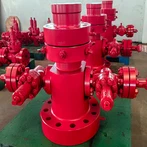Pup joints are short tubular sections used in oil and gas drilling to precisely adjust casing and tubing string lengths. The American Petroleum Institute (API) specifies its standardized material grades to provide the required strength and pressure capabilities. Two of the most common grades used are J55 and L80 which correspond to minimum yield strengths of 55,000 psi and 80,000 psi respectively.
J55 Pup Joints
The J55 grade designation indicates that the pup joint material has a minimum yield strength of 55,000 psi per API standards. J55 is a medium-strength carbon steel alloy commonly used for oil country tubular goods (OCTG) like casing. It provides an optimal combination of strength, toughness, and cost-effectiveness.
J55 pup joints are typically used in shallow to intermediate-depth wells or low-pressure applications that do not require high strength. They are manufactured from hot-rolled or electric resistance welded (ERW) J55 steel in various outer diameters. J55 allows for basic low-cost joint construction while meeting fundamental performance needs.
Compared to higher grades, J55 has good ductility which improves resistance to shocks and impacts during installation. It is less susceptible to hydrogen-induced cracking that can lead to catastrophic failures. The moderate strength rating enables flexible storage, handling, and rig operations. The J55 pup joint can be readily coupled with J55 couplings or other matching connections.
L80 Pup Joints
The L80 joint material grade indicates a minimum yield point of 80,000 psi per API specifications, a 45% increase over J55. The higher strength allows L80 to withstand greater internal pressures, tension loads, and bursting forces for demanding applications. It is alloyed with chromium, molybdenum, and other elements to improve properties.
L80 pup joints are advantageous for intermediate to deep well sections below 10,000 feet where high temperatures and pressures necessitate increased strength. L80 enables thinner wall thicknesses compared to J55, providing additional internal diameter for production. It has excellent toughness at low temperatures to resist cracks.
The fine-grain microstructure produced by thermo-mechanical controlled processing (TMCP) maximizes L80 joint strength. Care must be taken during handling and storage to avoid dents or other mechanical damage that could reduce integrity. Installation procedures should minimize scratching or gouging of threads. Overall, L80 provides superior performance where higher loads and pressures are anticipated.
Comparison Between J55 and L80
The main tradeoff between the J55 and L80 pup joint lies in strength versus cost. J55 costs 20-30% less owing to its lower alloy content, less intensive manufacturing, and more relaxed handling criteria. It may suffice for shallower, less demanding well environments. By contrast, L80 costs more due to alloying inputs and processing but enables deeper, higher-pressure well designs.
J55 has acceptable ductility, while L80 has exceptional toughness properties in high-strength applications. L80's superior corrosion resistance improves longevity, reducing long-term replacement and maintenance costs. Operators must balance these factors against the budget when selecting optimal pup joint grades for specific well trajectories and lifetime requirements.
Proper grade matching helps ensure safe, reliable, and cost-efficient drilling operations. Contact us at info@vigorpetroleum.com to purchase it.





